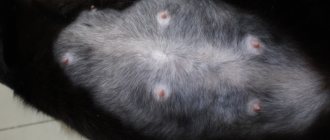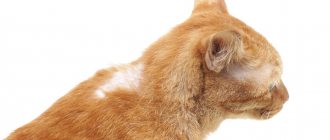A cat is the embodiment of comfort, a soft purring bundle of tenderness, always ready to offer its neck and ears for stroking, and curl up on a person’s lap. But when owners take a kitten into their home, they often cannot understand: why does the cat bite? While he is small, bites and scratches do not cause much pain, but his teeth and claws grow quickly, and trying to play with Murka can result in serious injuries. And sometimes a cat bites even when not touched, attacking first. There are many dangerous bacteria on teeth and claws. Cat bites and scratches do not heal well and often become inflamed. An aggressive animal in the house can greatly frighten a child. To avoid unpleasant problems, you need to educate him from the first days of the appearance of a purring pet in the house and know when and why a cat bites.
Norm or pathology
Sometimes some cats develop mental disorders, but this cannot be detected on their own. For this purpose, it is worth visiting a veterinarian and telling your concerns about changes in the animal’s behavior and the appearance of unmotivated aggression. Only a specialist will be able to determine whether this is related to pathology or is a character trait.
But most often bites are caused by other reasons. Cats are one of the most independent pets and this needs to be taken into account. And everyone's character is different. While some are very affectionate and love attention from their owner, others don’t like it.
Some animals, even living for a long time in a family, try to keep a distance from people and cannot stand a familiar attitude towards their person. These are already individual character traits and it will not be possible to change temperament.
Use positive reinforcement
The goal in such situations is to teach the cat that everything pleasant (play, food, attention) must be earned, and that you are in command. Then rewards and resources can be used to motivate the cat to respond correctly.
For example, teach your cat to “come” by using lunchtime to its advantage.
Before your cat receives the food bowl, say “let's go” in a cheerful, loud voice, then turn on the can opener, shake the food bag, or grab a treat jar.
Your cat has already learned these cues and the time to run to her bowl, so you simply teach her to associate the command with an action. When your cat obeys, reward him with a treat or a bowl of food.
You can also clicker train your cat by pairing food rewards with a clicker that makes noise. Eventually your cat will begin to think of the clicker as a reward, and treats may no longer be necessary.
Reasons for unexpected aggression
Cats can bite in different ways. There are two options for this behavior:
- The rarest one is when the pet gently bites its fingers, while the claws are removed and its actions are more pleasant than not. This is what they do most often when communicating with their offspring. When a cat behaves like this with its owner, it means it trusts him and loves him very much.
- More common is a sudden change in behavior. A second ago, the pet took the stroking absolutely calmly, showing no signs of aggression, but now it turned over and began to painfully bite and scratch the hand.
It is important to understand the reasons that motivate cats to bite and scratch their owner's hands. Among the most common are:
Aggression
Often a sign of problems with the pet's socialization. Breeders try to accustom a kitten to stroking in early childhood - up to 7 weeks of age. If this is not done, then in adulthood such an animal will shy away from affection from its owners and bite.
Pain
It is important to remember that cats, like people, are not always healthy; they have stomach, back, head, joint pain, and may have skin problems. Therefore, when showing affection, when something is not right with their health, they can bite. By this they are trying to tell the owner to leave them alone.
If behavior that is not typical appears, you should contact a veterinary clinic for examination, as this may be an indirect sign of illness.
Static electricity
Often, if the animal's fur is too dry and the air humidity is high, microdischarges may form when stroking. A person may not notice this, but it is extremely unpleasant for a pet, so he may bite.
Pet gender
This factor also needs to be taken into account. Many cats are more affectionate, but can be aggressive once they become mothers. Cats are often independent and do not like excessive affection, with the exception of castrated individuals; they begin to show more attention to the owner and demand the same from him.
Increased attention from a person
It must be remembered that these are independent animals that do not like being forced on them. The exception is Oriental cat breeds. Such pets are extremely sociable and loving. But they can also be in a bad mood when affection does not bring pleasure.
Dream
Some cats fall asleep during stroking and, if the rhythm or pressure changes, they may wake up and bite. This behavior is common among poorly socialized pets who always expect trickery from people. Or another situation - the animal is sleeping so soundly that stroking came as a surprise and frightened it. In this case, it is simply a defensive reaction against fear.
Dominant behavior
The cat thus tries to establish himself and show that he is the boss in the house. He tries to control the process of affection on the part of the owner.
Negative experiences in the past
Often people pet their pets before unpleasant procedures, such as nail trimming or bathing. But for them the model is fixed: if they stroked it, something unpleasant happened. And subsequent displays of affection on the part of the owner will provoke biting and scratching.
Early weaning
Cats teach their offspring that a person is a friend, he feeds, caresses and does not cause pain. If you take the kittens away from her too early, they won't recognize it and may perceive people negatively. Pets raised on the street also display a similar pattern of behavior. Cats do not know that their owners are trying to show their love and care in this way, but consider affection a threat to themselves.
Feeding kittens and pregnancy
During this period, some cats may experience a change in character, and in this way they try to protect their offspring and protect them.
Why are cat teeth dangerous?
Research has shown that after cat bites, one in three people attacked requires hospitalization. Why is such an act so threatening that it could land the victim in the hospital? Not at all because of bacteria in saliva. Their teeth are to blame for much of the damage caused by these rodents.
Dog teeth are relatively blunt and wide, and do not penetrate so deeply into the tissue. Cat incisors are sharp, like saws, and easily drive to great depths, moving saliva bacteria, streptococci and staphylococci from human skin to the center of the wound. (Oral prevention: how to brush your cat’s teeth).
On the outside, the bite site is small, sometimes it’s just red dots, and the blood around it quickly dries up. But, unfortunately, the wound is easily infected by microbes. Superficially washing the skin with soap and water and disinfecting may not destroy bacteria that have already entered deep into the tissue. If they reach the joints and tendons, general ailments will begin, which can ultimately lead to a hospital bed.
It is worth taking seriously why a cat bites when you pet it. Wounds associated with the teeth of these animals, unfortunately, are not very simple. Each bite must be examined by a specialist and the issue of treatment must be decided. Failure to respond promptly with antibiotics and reliable treatment can have dangerous consequences.
As bacteria spreads in the wound, the pain becomes stronger and stronger, swelling may appear around the damaged area, and the infection spreads along with the blood throughout the body. Therefore, act quickly:
- First, don't block the blood. Allow it to flow spontaneously from the wound for a while, clearing it of germs.
- Secondly, wash the bitten area with soap and water and disinfect it with hydrogen peroxide or antiseptics.
- Third, apply antibiotic ointment.
- Fourth, put on a bandage.
All this can and should be done immediately after the incident. Then it is best to contact your doctor directly. If you are unable to do this, monitor your condition for fever, swelling, or throbbing severe pain, not necessarily limited only to the wound site. If you notice alarming symptoms, be sure to visit the hospital.
Cat behavior patterns
Experts have identified several behavioral patterns in cats when they can bite people:
A game
It's always aggression, but like studying or training. The objects are models (rubber ball, artificial mouse, rattle on a string, etc.). For kittens, this is training, learning to hunt, which is certainly accompanied by bites. Therefore, you should not play with your hands or feet with your pets, as they begin to be perceived as a “victim” that needs to be caught and neutralized. When playing with children, at first this behavior is amusing, but this pattern of play will become ingrained in him and in adulthood it will be difficult to wean him off this pattern.
You need to entertain your pets only with the help of special devices for cats.
Host - food
People are a source of food for their pets, so you shouldn’t tease them with food or treats, much less leave it all in a visible place. By biting and scratching, cats try to get their owners to give them another portion of goodies.
Licking the owner's hand - biting
Often people who keep a cat at home are surprised by this pattern: the pet was just purring and licking its fingers and suddenly bit. There may be several reasons for this behavior. For example, unrealized maternal instinct. When licking their offspring, cats may bite. Or it could be a sudden change in the animal's mood. Thus, the pet wants to say that he is tired of affection and needs to be left alone. To prevent such incidents, it is important to pay attention to the cat’s body language and notice changes in his mood. Thus, twitching of the tail and skin on the back, billowing fur indicate an imminent attack on the owner’s hand.
Resentment
For the most part, cats are not vindictive and do not hold grudges for long. But when the owner does not allow them to play with some object or does not allow them into a certain room, they can get angry and show their dissatisfaction with this by biting. With this behavior, you need to try to switch the pet’s attention to another thing, try to distract it with a game.
Secondary aggression
Cats are very addicting creatures and often after an interesting game with an artificial mouse, the owner, wanting to pet the pet, gets hit on the hand with a clawed paw. This happens because the animal has not calmed down and is still in the process of playing for a little while.
The recipe for this behavior is simple - let the cat calm down a little, and after time has passed, pet it.
Primary aggression
Often, in response to physical punishment, the pet begins to show hostility towards the owner. This is due to the fact that he adopts a human behavior model and enters into a kind of fight. It is important to remember that physical punishment is not the best way to raise cats and should not be used. You should scare him with a loud sound or sprinkle water to stop the attack. Sometimes primary aggression indicates an illness in the pet, so if all other reasons for this behavior are excluded, but if the cat continues to rush at people, you need to take him to a veterinarian for examination.
Why does a cat bite just like that?
For the most part, cats never bite for no reason, but there are situations when people feel as if they are being attacked for no reason. However, this is not the case and there are several factors influencing this behavior, in addition to those described above. These include:
- Changing teeth. Animals, like humans, first grow baby teeth, which are subsequently replaced by permanent teeth. In cats, this period begins at 3-4 months of age. In this case, there may be pain and discomfort in the oral cavity, and they begin to actively bite the owner’s hands. It is important to prevent the pattern of such behavior from becoming established at this point. Otherwise, even an adult animal will continue to gnaw people’s fingers. You need to buy special rubber toys that your pet will scratch his teeth on.
- Sexual desire. During this period, many cats become aggressive. This is easy to notice: they leave marks on the territory of the apartment, scream heart-rendingly and ask to go outside. There are two options for solving the problem: castration and selection of a partner.
- Declaw removal. Currently, this inhumane operation is common in veterinary practice. If after it the pet begins to bite, this indicates either revenge, or that his teeth are the only weapon with which he can stand up for himself and this is what the cat uses.
- Lack of attention from people. If the pet is not played with and petted a lot, a bite is its way to interest the owner. You should devote at least 10 minutes a day to communicate with your pet, and the problem will disappear.
- Lack of care. If the tray is not cleaned or there is a lack of food, the cat tries to let the owner know that it is time to clean up his toilet or feed him.
How to recognize readiness for an attack
Cats do not bite without warning; it is important to pay attention to the signs before attacking. These include:
- the animal's posture changes;
- the pet’s body tenses, which can be felt when touched;
- the purring suddenly stops;
- ears flatten;
- anger in the gaze, pupils dilate;
- the nature of the sounds produced becomes threatening, for example, rumbling, purring;
- the expression of the muzzle changes from peaceful to angry;
- the tail begins to twitch.
One or a combination of signs indicate that the pet is aggressive, that it has begun to get angry and that it will soon attack a person. You should not ignore them, but it is better to leave the cat alone for a while so that he calms down.
Boredom
Often an adult cat bites its owner simply because it is bored. The animal wants to attract attention, so it first begins to lick, and if the owner does not react, then bite. In order for your pet to stop behaving this way, it is recommended to spend more time with him, playing, talking, or just sitting together in front of the TV.
Cats perfectly understand the mood of the owner, and just like people, they require communication and attention. You should not scold or punish an animal when, after a long separation, it begins to lick and bite. In such situations, it is important to communicate with your four-legged friend so that he understands how dear and loved he is in the family.
How to stop a cat from biting
There are several techniques that can be used to rid your pet of a bad habit and prevent it from developing. These include:
- Proper communication with guests. A kitten should not perceive people as aggressors, so it is worth accustoming it to them from a young age. But it is also important that those who come behave with respect for the pet: do not pick him up if he does not like it, do not throw him up (he may get scared) and do not bother him too much. If an animal has huddled in a corner in front of guests, there is no need to drag it out of its shelter to show off to your friends.
- Your pet should have toys with which he can have fun, but should not play with his hands.
- If a cat bites, you should make a sharp sound and he will let go, as it is unpleasant for him. For example, clap your hands or shout sharply.
- If episodes of aggression have become frequent, and all familiar causes of such behavior have been ruled out, it is worth visiting a veterinarian; the problem may be a pet illness.
- After the bite, show the cat that it is unpleasant. You can ignore requests for a treat or to continue playing.
- It is important for the owner to determine the approximate time during which the pet allows stroking and not to neglect this knowledge.
- In case of frequent bites, you can prepare a container with a spray bottle and spray it on the cat in case of aggression. He will get scared and run away. This will wean him from such behavior.
- Get vaccinated against rabies regularly. Your pet can become infected with this incurable disease and become dangerous to others. Therefore, you should not neglect regular visits to the veterinary clinic.
Stress from change of environment
Cats have a very hard time dealing with changes in their surroundings, be it renovations, rearranging the apartment, or moving. At the same time, their stress is quite long-lasting and acute: they do not allow their owners to approach them, refuse to eat and drink, and may begin to shit in the wrong place, or even hide somewhere in a corner for a couple of days.
All that remains for the owners to do is to accept it and wait a little. There is no need to forcibly pull the cat out from under the sofa, pet it and calm it down: the animal needs to calm down, get used to the new environment and rehabilitate itself.
What to do if kittens bite: parenting recommendations
Kittens, like children, need to be raised, only this is done differently. It is important to remember that the sooner you start this process, the more effective it will be.
It is more difficult to retrain an adult animal than a baby. If he bites hard, you need to stop playing and clearly, loudly say “No” and stop interacting with him, ignore him for a while. You can hiss at him after a bite. Another option is possible - to switch attention to something else, for example, a toy, but you cannot give a treat. Otherwise, he will take this as praise and will continue to behave aggressively towards people.
It is important for the owner to pay attention to the pet’s character and favorite places for petting. So, some cats like to be stroked on their bellies, while others categorically cannot stand it and allow themselves to be touched only on their backs.
In any case, it is necessary to find out the cause of aggressive behavior and eliminate the factors leading to it. If you can’t cope on your own, you can seek help from specialists.
1111










